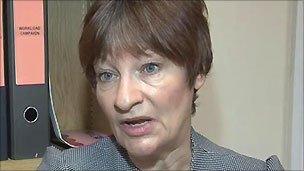Teachers support strike ballot on pensions
- Published
BBC's Gillian Hargreaves: "Strike action could come as early as June"
Teachers have voted for a widespread campaign of industrial action against cuts to public sector pensions.
The National Union of Teachers has voted to ballot its members for a one-day strike in the summer.
The union's conference also called for a 24-hour "general strike" in the autumn over pensions, to be organised with other public sector unions.
Ministers say they want to reduce the cost of public sector pensions, but insist changes will be fair.
"NUT conference today sent a clear message to government that teachers will not stand by as their pensions are eroded," said the union's general secretary, Christine Blower.
'General strike'
The NUT is the second teachers' union this week to call for a strike ballot over pensions, following the backing for a similar strike ballot by the Association of Teachers and Lecturers.

Christine Blower says teachers will not "stand by as their pensions are eroded"
A joint action by the two unions could mean disruption for almost every school in England and Wales, with a strike date possible as early as June.
In another challenge to the government's pension reforms, the NUT also passed an amendment calling for co-ordinated strike action with the TUC across the public sector beginning with a one-day "general strike".
Moving that amendment, Paul McGarr from east London, said: "If the government doesn't relent when we strike in the summer term we won't just need to march together we will need to strike together."
Lambeth delegate Jessica Edwards said co-ordinated action was not just about pensions but the wider programme of cuts.
She added: "The call for general strike chimed with the members in our staffrooms because teachers know how high the stakes are."
'Unaffordable'
Delegates at the NUT conference in Harrogate heard warnings that the pensions changes would mean teachers will be required to pay more, work longer and receive less when they retire.
Moving the proposal on a ballot for a series of strikes, NUT executive member Jerry Glazier said the action was not a decision taken lightly.
But the government's proposals to cut their pensions "were unaffordable for teachers, unsustainable and simply unfair," he told the conference.
There were also speakers against the call for a general strike.
John Blake argued against the amendment to the pensions motion saying the words "general strike" had "haunted the conference like an illiterate poltergeist".
He suggested it would put off members in other unions from taking action.
While Simon Horne from Haringey, warned against calling for general strikes saying it was not a given that union members, including the NUT, would vote for a strike.
The shadow education secretary Andy Burnham has also said he does not support plans to strike over pensions.
Schools Minister Nick Gibb, who was jeered at the ATL conference over pensions, has invited the heads of teachers' unions to discuss the changes.
However, the Nasuwt teaching union, also holding its conference this weekend, says it will wait until every other option is exhausted before deciding whether to ballot for strike action.
Members are due to vote on Sunday on a motion calling on the union's National Executive to work to oppose, "using all appropriate means", changes to pension schemes that reduce members' benefits.
A Department for Education spokesman said the government had accepted the recommendations of Lord Hutton's report into public sector pensions as a basis for consultation.
"Lord Hutton has made it clear that change is needed.
"People are living longer - in the early 1970s life expectancy of a 60-year-old was around 18 years: now it is around 28 years.
"We will set out proposals in the autumn that are affordable, sustainable, and fair to both the public sector workforce and taxpayers."
- Published20 April 2011
- Published10 March 2011